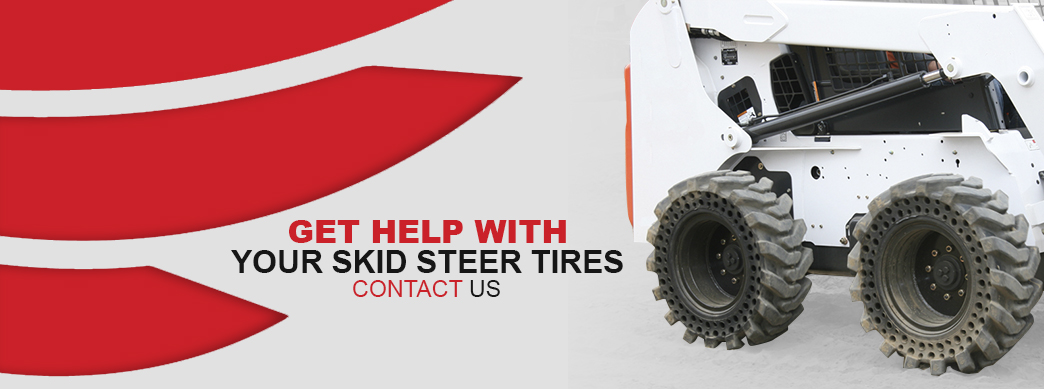
How to Pick The Right Skid Steer Tires
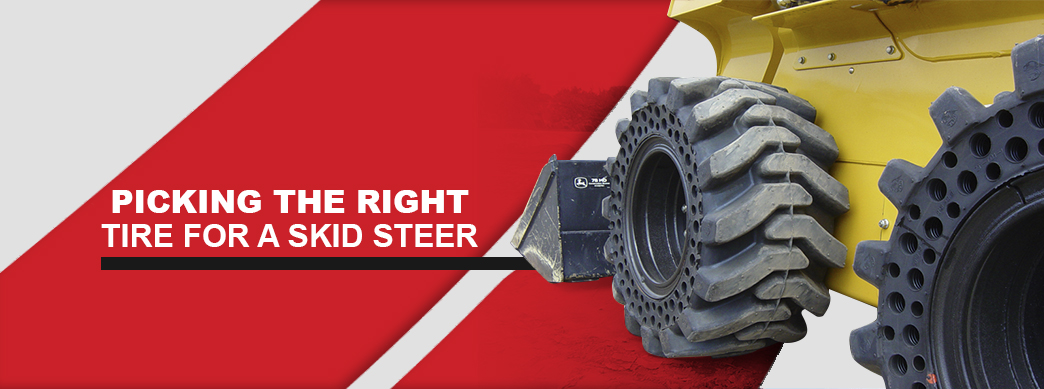
When you need new tires for your skid steer, don't just pick the set with the lowest price. Not choosing the best skid steer tires for your purposes could end up costing you more money over time.
You rely on your skid steer to work hard on the jobsite — choose tires that will work just as hard and last for a long time.
Importance of Skid Steer on the Jobsite
Skid steers have multiple uses on a job site, depending on which attachments you add to the front. The number of accessories and the strength of the machine are the only things that limit the tasks a skid steer can accomplish. Some common attachments your skid steer loader may use and their functions include:
- Grapple: Grab and carry action. A skid steer grapple bucket is perfect for demolition and clean up.
- Dozer Blades: Attachment of choice for clearing, grading, leveling, cutting, pushing, and piling.
- Stump Buckets: Skid steer stump buckets are made for digging, prying up stumps.
- Broom: A broom makes cleanup of your jobsite a breeze.
- Auger: For drilling holes in a jobsite, an auger attachment on a skid steer reduces your effort on the task.
- Landscaping Tiller: Forget separate tillers for plowing large garden plots — you can turn your skid steer into a digger with this attachment.
- Utility Fork: To facility lifting and moving hay and other similar substances, a utility fork works better than a bucket.
- Dirt Bucket: Dirt buckets are explicitly designed for lifting and moving dirt from a jobsite.
- Pallet Fork: If you need to move a few pallets but don't want to rent a forklift, a pallet fork attachment makes your skid steer capable of lifting and carrying pallets safely and securely.
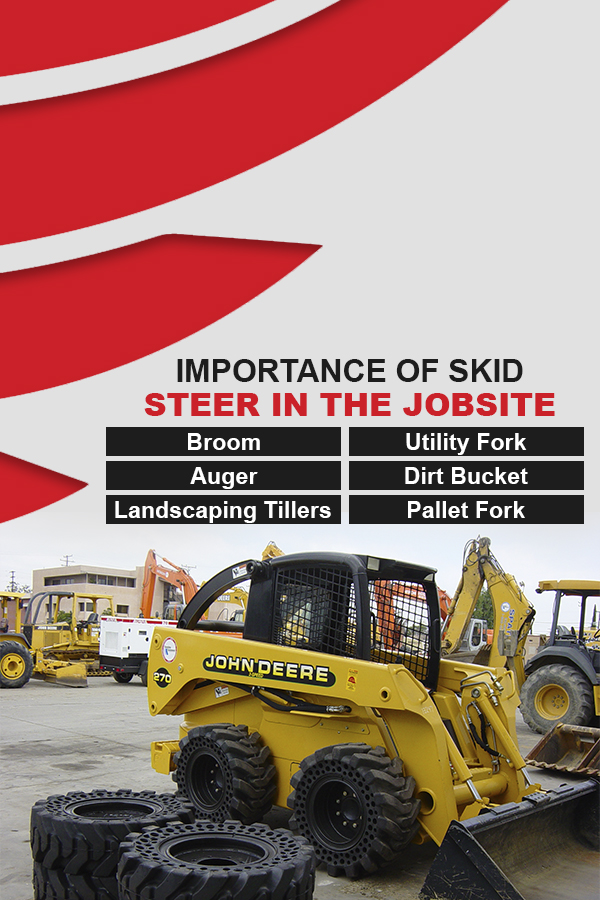
These attachments only reflect a handful of the options available for skid steers from a variety of manufacturers. You can find many more from your construction equipment attachments manufacturer. Just as your choice of attachment will make a difference in how your skid steer loader performs on the job, so will your choice of tires. The right tires can improve productivity and reduce downtime. If you put the wrong tires for your needs on your skid steer loader, however, you could find yourself wasting both time and money.
Typically, skid steers operate on wheels, while multi-terrain loaders use belts to drive in snow and other severe conditions. To get the best of both worlds, you can find over-the-tire track that will convert your skid steer loader into a multi-terrain machine.
Industry-Specific Needs
Your industry likely dictates how you use your skid steer loader. While these machines are often part of construction and demolition projects, they're small enough to use almost anywhere.
When you select your tires, you'll need to account for the environment you use the skid steer in, as well as the attachments you use with it. The amount of grip the tires have on the ground can affect the vehicle's performance, but too much grip can ruin a landscape. Balancing the two becomes part of knowing how to pick the right tire for your skid steer.
When selecting tires, you'll have the choice of solid cushion or pneumatic. You also need to pick the tread design and the compound. The right decisions in these areas can boost your productivity. However, if you make the wrong selection, you'll find you've wasted both time and money.
Here are some examples of industries and the tires they may need.
- Mining: For driving through rock-strewn quarries, you'll need durable tires that have a wider footprint for increased longevity and wear. An off-road pattern is a must in the rugged conditions associated with the mining industry. While pneumatic tires might work for this situation due to their smoother ride on rough surfaces, they are also prone to flats from sharp rocks on the ground. Use this tire type with caution in mining applications.
- Construction: The conditions of the construction site will determine the type of tires used. For almost finished sites with smooth pavement, you may need non-marking tires to prevent damage to the area. Alternatively, you may require deeper treads to provide you with increased traction on smooth concrete. Flat-proof tires protect your vehicle from damage caused by construction debris.
- Demolition: Just as skid steers used for construction require sturdy, flat-proof tires, so, too, do vehicles used in destruction. The debris on the ground needs tires that won't puncture when driven over sharp objects. To increase grip on the ground — especially when moving heavy loads — opt for wider tires with all-terrain treads. These design features will ensure you get a balance of long-life and driver comfort.
- Extreme Use Tasks: If you will push the skid steer loader to its pushing or pulling limits, you need tires that will perform to such extremes. To avoid tire and rim separation from the excessive force placed on the vehicle and its wheels, install tires that have rims bonded inside them. You will not have to worry about the rims spinning and the tires locking in place during use with such a bonded design.
- Recycling: With broken metal, glass and other objects in the area, you need flat-proof solid cushion tires when driving a skid steer around a recycling facility. With solid cushion tires, you'll avoid frequent flats that could stop operations.
- Standard Use: For driving over dirt, standard pneumatic tires with dirt tread may suffice, especially for general use. These tires, however, pose the hazard of possible flats during operation.
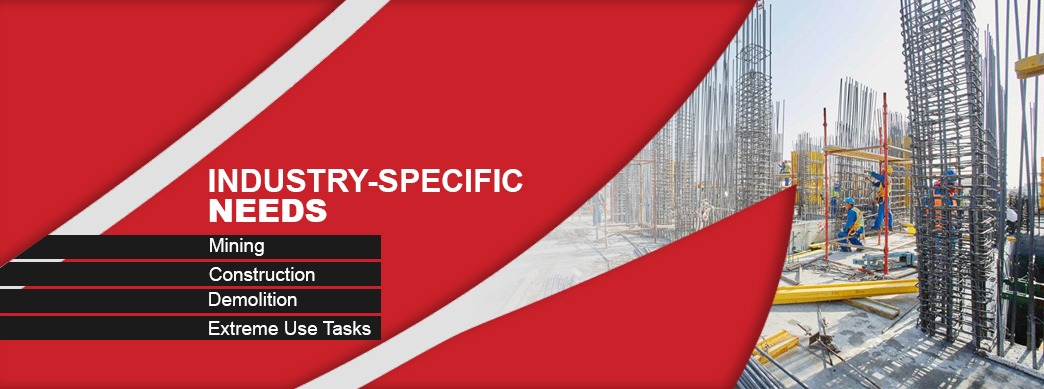
Solid Cushion or Solid Skid Steer Tires vs. Pneumatic Skid Steer Tires
The first question you need to ask yourself when choosing tires is whether you want solid cushion or pneumatic tires. Both types have distinct differences, and you may prefer one or the other, especially if you are an owner-operator of your skid steer.
1. Solid Cushion Tires or Solid Skid Steer Tires
With our semi-pneumatic hybrids, you can enjoy the durability of solid tires with the comfort of pneumatic. These are not filled tires. McLaren solid skid steer tires are solid rubber tires strategically perforated with tubular holes for that soft cushioned ride and flexibility when running over rocks and rough terrain.Thanks to our original technology, our solid skid steer tires feature three layers. The innermost layer is a sturdy, wire-containing compound. Next, a cushioning layer has holes to admit air and provide increased driver comfort. Lastly, the durable outer layer has puncture resistance to make our tires flat-proof. Compared to OEM tires, our solid cushioning tires last four to five times longer. Additionally, you'll get better traction and more lifting power thanks to the improved grip on the ground.
2. Pneumatic Tires
Pneumatic tires tend to offer more comfort for the driver due to their cushioning ability. However, these tires require air pressure checks and refills on occasion. Additionally, if you drive your skid steer through construction sites filled with debris such as nails and other sharp objects, your vehicle could get a flat that would put it out of commission for the rest of the day.
Different Tread Design Options
Your industry and where you use your skid steer will help you choose the right tread design for your project. Shallow designs work better on roadways or when you want to minimize the impact on the landscape. If you need to drive over mud, sand, dirt, gravel or other loose materials, though, you'll need deeper treads, which give you better traction.
Your options include:
- Off-Road Treads: Designed for use in any condition, off-road treads get your skid steer loaders where you need them to be regardless of the presence of mud, snow, sand or gravel. Ideally, stick to using these tires off-road since they may wear out prematurely.
- On-Road Treads: For driving on asphalt and concrete, you need on-road treads. These provide the smoothest ride possible but don't use them for off-road use. You may not get enough grip when using on-road tires on rough surfaces.
- All-Terrain Treads: The treads designed for all-terrain use have deeper grooves and more rubber. These adaptations give this type of tire the ability to grip the ground, whether driving over solid asphalt roads or loose materials like snow, gravel or sand.
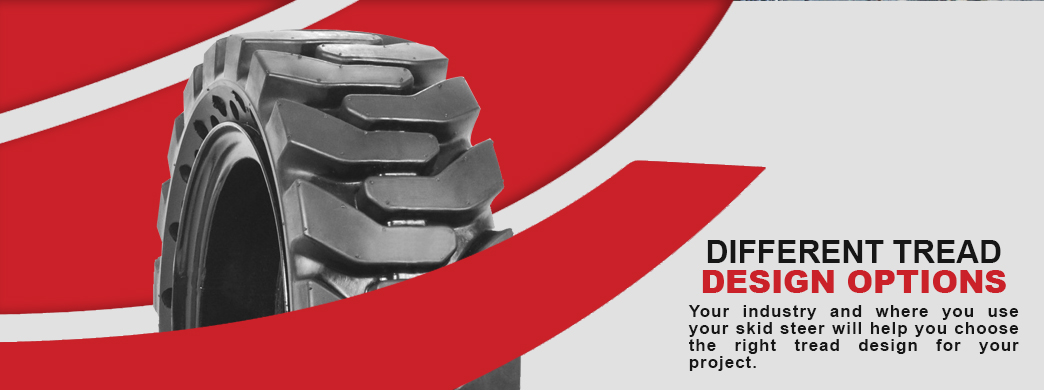
Tread Compound Options
The compounds used to build the tires vary widely among manufacturers. The materials also depend on whether you have pneumatic or solid cushion tires. For solid cushion tires, you have three layers of various rubber materials, and each segment has a specific purpose. The innermost secures the tire to the rim without tearing, the middle layer cushions the ride and the top layer provides a protective barrier against debris damage.
For pneumatic tires, the composition depends on the use. Regular duty tires are made of standard rubber, whereas heavy duty ones have extra-strong rubber that cuts down on wear. For extreme conditions, the most robust pneumatic tires have stronger rubber, more rubber and greater depth. These three attributes ensure these tires can sustain rough handling and use in rugged terrain while still cushioning the ride. However, even the heftiest pneumatic tires require regular air checks to ensure proper operation.
Why Selecting the Right Tire Helps ROI
Your return on your investment comes from your choice of tires. If you know how to choose the best skid steer tires for your jobsite, they will last longer and reduce your downtime.
Tires designed for use on concrete tend to be harder and more durable, lasting longer than pneumatic tires used for rugged terrain. However, if you drive with concrete tires that have shallow tread over snow, you may not get the grip needed. Despite their name, you should not experience skidding when driving a skid steer loader. Trying to use the wrong tires in rough conditions can cause slippage, accidents or injuries.
How you use the tires makes a difference in the length of time they will last. Some examples of longevity by application of skid steer tires vary as widely as 400 to 1400 hours:
- Demolition Contractors: Driving over the rough terrain of a debris-covered demolition site can cut the hours of use for skid steer tires to 400 hours.
- General Contractors: A general contractor who typically uses a skid steer loader on flat, even surfaces such as asphalt parking lots, concrete streets or dirt roads could get up to 800 hours of use from a set of tires.
- Owner-Operators: Conscientious owner-operators who meticulously choose the right tires and use them correctly can squeeze up to 1400 hours of use from their skid steer tires.
For the most extended life, choose tires with the deepest tread. For skid steer loaders, the tread depth directly correlates to the lifespan of the tires. For instance, compared to standard tires, those with 20 percent deeper treads should last 20 percent longer.
If you choose tires that do not support your skid steer and its operation, the tires will wear out much faster than those created for your vehicle. If you're in doubt whether a set of tires will work with your skid steer, consult with your tire manufacturer. Replacement tire makers have a wealth of knowledge about the machines they create tires for and which of their products works best for certain situations.
Increase Your ROI on Tires
Part of increasing your ROI is knowing to pick the right tires for skid steer loaders in your fleet. Maintaining those tires and vehicles is another way to ensure you maximize your return on investment. The last thing you need is shutting down your operations to change a tire. Since tires account for up to 20 percent of your skid steer's operating cost, maintaining them and reducing sudden failures will prevent profit loss.
Check for Wear
Check the tires after every use. Clean out debris and examine the tires for signs of wear — such as holes, missing tread, cracks and a shallow tread. Signs of wear indicate you need to replace the tire before it fails. If you have pneumatic tires, you can also look for tires that don't maintain their air pressure, suggesting a possible leak. Also, keep in mind that more massive machines put higher pressure on the tires and need replacements sooner than smaller skid steers.
Protect Tires From Damage
You can do several things to reduce the strain on your skid steer tires and increase their lifespans. If your skid steer uses a counterweight, remove it when not required. Doing so cuts down on the force put on your tires.
Also, use tires appropriate to your application. Don't use off-road tires on streets to prevent wear. Heavy-duty applications require stronger tires than light-duty tasks. If you use your skid steer in a variety of conditions, consider all-terrain tires or choose one that works for the surface you work on most often.
Get Help With Your Skid Steer Tires
Once you know how to pick the best skid steer tires for your needs, you'll need to order them. If you need help selecting your tires, call us at McLaren. Real people answer our phones, so you'll never have to deal with an automated system. Our customer service extends beyond having humans take your calls — we regularly offer promotional pricing on our products. Plus, with our network of warehouses, we can get your order to you on time. Since we manufacturer our tires, we can ensure you won't have failures in your tires from the design.
Because skid steer tires are not universal for every application, take a look at the tires we offer. You'll find durable tires with the treads you need. We offer semi-pneumatic tires that blend the best of both the pneumatic and solid tires. For more about our tires or if you have any questions about our products, contact us through our online form or give us a call at (800) 836-0040.

 By McLaren Industries
By McLaren Industries 